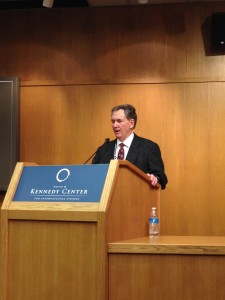
Former CIA officer Bradford Bruton spoke strategy to students seeking careers in intelligence or federal service at the Kennedy Center on Jan. 29.
Bruton outlined several different steps students could take to better their chances of employment in the CIA. He emphasized the importance of good résumés and LinkedIn profiles, knowing a language or two and applying early.
“You need to be looking for doors that are going to give you an opportunity to do what you want to do,” he said.
Résumés
Bruton said signing into the websites of potential employers and having them push their career descriptions is valuable because it can give a sense of the positions for which they are constantly advertising and no one is applying.
He told a story of receiving a promotion and traveling to Israel for work simply because no one else applied for the job.
Bruton told the audience to write résumés in the same language the employers have on their website and using the same key words on a résumé.
“If you don’t have a great résumé here right now, bam bam bam,” Bruton said as he fake-shot the audience with a hand in the shape of a gun. The audience laughed.
While Bruton walked to campus this week, he was offered a full-time job supervising contractors in the Middle East. The potential employers found him through his LinkedIn page. He turned down the job but used the experience as an example.
“Your LinkedIn page has to be better than your résumé. Has to be, has to be — there’s no option,” he said. Bruton also said keeping tabs and looking up people who are practitioners in a desired field is valuable.
Language skills
More than half of the people in the audience raised their hands when Bruton asked if they spoke a foreign language. Daniel Jones was one in the crowd who raised his hand. He is an Arabic and Middle Eastern studies major specifically because of his interest in the CIA and federal services.
“It’s part of the reason I got into the program,” Jones said.
Bruton emphasized the importance of language skills in the CIA to the crowd. “Whatever your current level of language skill is, it is not good enough,” he said.
Bruton said when it comes to language, students need to be advanced in one or proficient in a mixture of multiple languages.
“You need to be in a language class every semester without fail,” he said.
Other skills
Bruton said those with a computer science degree are eligible because people with those skills are good at targeting, which, Bruton said, is key to intelligence analysis.
“Intelligence analysis is based on looking at an area over a period of time and looking for changes. Change drives the intelligence community,” he said.
He continued by saying applicants must be “committed news junkies.” He recommended listening to the BBC “The World” newscast, which is only thirty minutes, as a small commitment to a larger goal.
Another thing that may help is being in the right place at the right time. “Christians don’t get lucky; Christians get blessed,” Bruton said.
Apply early
Bruton said the highest priority is getting an internship with clearance from the CIA or a graduate fellow internship. He offered school-level-specific recommendations.
Freshmen should “get the best GPA you can this year so you don’t have to play catch-up for the rest of your years,” he said. If applicants have a GPA lower than 3.0, it is not likely they will be hired.
Sophomores should apply for internships in April, May, June or July the year before they expect to have their internships start, if selected.
Bruton said juniors should apply for a full-time job entrance on duty in April, May, June or July a year before they expect to begin, if chosen.
Seniors should apply for graduate fellowships 14 months before the programs begin. Bruton also advised students to apply to a graduate school because the program acceptance requires an acceptance letter from a graduate school.
“The goal is to get in the door,” Bruton said.




